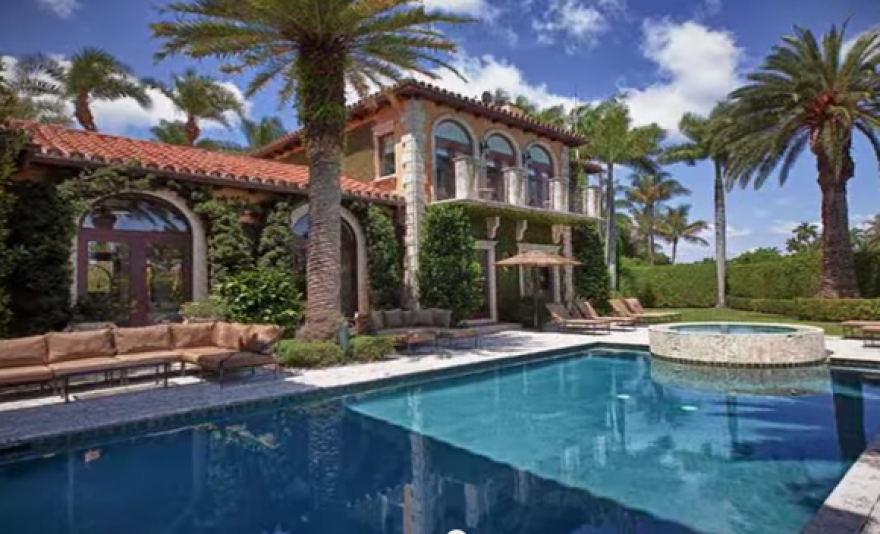In March, hundreds of Brazilian-Americans in South Florida gathered at Miami’s Bayfront Park to protest massive corruption in Brazil. But many may not have known that one alleged perpetrator of all that graft back in their mother country owns a home – a really big one – just across Biscayne Bay.
He's Ricardo Teixeira, the former president of the Brazilian Soccer – or Football – Federation, known by its Portuguese initials, CBF. Teixeira has a luxurious, eight-bedroom waterfront mansion on Miami Beach’s ultra-exclusive Sunset Islands. He and the property company he set up to purchase the house three years ago for $7.4 million are now trying to sell it for $12.9 million.
One possible reason: Teixeira may need some of that money for legal fees.
RELATED: Latin America Needs To Be Institutionalized. Seriously
That’s because Brazilian authorities are asking federal prosecutors there to charge Teixeira with corruption. The case reportedly involves $147 million in alleged fraud, money laundering and tax evasion, much of it related to bribery and kickback payments from corporate sponsors.
“They might actually go after him this time,” says Christopher Gaffney, an urban studies professor who has spent years in Brazil observing its famous football culture – and its equally infamous corruption culture.
As Gaffney points out, this isn’t the first time Teixeira has faced these accusations. He resigned as CBF president in 2012 under clouds of suspicion in Brazil. Even the country’s ultra-corrupt Congress was eyeing him. The charges, however, never stuck.
It's insane. There are no words to describe the sadness to see there's no entity in Brazil that is uncorruptible. - Rodolfo d'Ave
But this time the anti-corruption mood in Brazil – which last year hosted the World Cup amid protests over massive cost overruns – is more serious. And right now that’s thanks in large part to a superpower Brazilians aren’t known for applauding all that much: the United States.
Last month the U.S. handed down more than a dozen indictments in an effort to clean up the epic graft inside FIFA, international football’s governing body. Some of them targeted Brazilian football officials and corporate sponsor executives.
“Everyone in Brazil knows how corrupt football is,” says Gaffney, who now teaches at the University of Zurich in Switzerland, where FIFA is based, and is the author of “Temples of the Earthbound Gods,” about South American football stadiums. “So Brazilians are happy to see this process go forward.”
Teixeira wasn’t named in the U.S. indictments – although Brazilian media are now reporting the FBI is investigating him, too. But Gaffney thinks the U.S. may have shamed Brazilian authorities into making it public this month that they’re finally going after the ex-CBF boss.
“They would not have moved had there not been this international groundswell of happiness at this [U.S.] investigation,” he says.

But there are possibly deeper consequences. By intensifying the spotlight on football corruption in Brazil, the U.S. may also help make the country less tolerant of its more general – and worsening – corruption problem.
The Brazilian ex-pats who flocked to Bayfront Park in March are especially appalled at the newest corruption outrage in Brazil – which may be the worst in the country’s history.
“It’s something insane,” says Rodolfod’Ave, a Brazilian entrepreneur who emigrated from Rio de Janeiro to South Florida four years ago.
That scandal involves Brazil’s state-run oil company, Petrobras: Scores of politicians and corporate executives are being charged in a kickback scheme that could end up totaling a billion dollars.
“This is unbearable,” d’Ave told me while sitting outside a Starbucks in Pembroke Pines where he now lives. “There are no words to describe the sadness to see there’s no entity in Brazil that I would say [is] incorruptible, you know?”
CORRUPTION COSTS
In fairness, the Brazilian government has been addressing corruption more seriously in recent years. Some top government officials have even gone to jail, an extreme rarity in Brazil. Still, the problem costs the world’s eighth-largest economy more than $50 billion a year.
That burden is one big reason so many business owners like d’Ave are leaving Brazil these days. He says Brazilian officials often shook down his companies for bribes, especially his gas station in Rio. “They would threaten me,” he recalls. “I had to pay them not to give me [bogus] fines.” The practice, he adds, eats deeply into revenues.
“You better put aside at least 5 percent,” d’Ave says. “You’re talking about bribery all over. You gotta pay kickback money in order to have a contract – this is the most common thing we see in Brazil.”
But not just in Brazil. Corruption remains one of the biggest plagues all over Latin America and the Caribbean. Most of the region’s countries rank in the bottom half of the annual corruption index published by the Berlin-based watchdog Transparency International.
All but one of the 14 people indicted by the U.S. in the FIFA case are from Latin America and the Caribbean. Many are current or former officials at CONCACAF, the FIFA affiliate based in Miami Beach that governs football in North America, Central America and the Caribbean.
One of them is Jack Warner of Trinidad & Tobago. In a recent video he produced, he denies the FIFA charges – “I am a man excoriated,” he said – but at the same time he threatened to reveal more corruption.
“There can be no turning back,” Warner said.
If so, it’s up to folks in Latin America and the Caribbean now to show they can kick corruption as confidently as their national teams boot soccer balls.
Tim Padgett is WLRN's Americas editor. You can read more of his coverage here.



